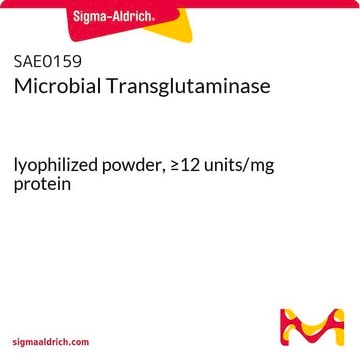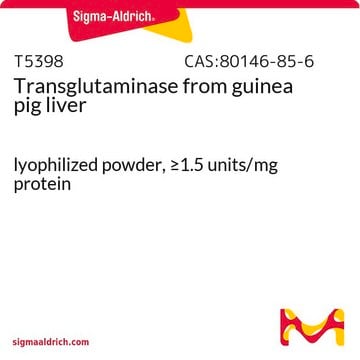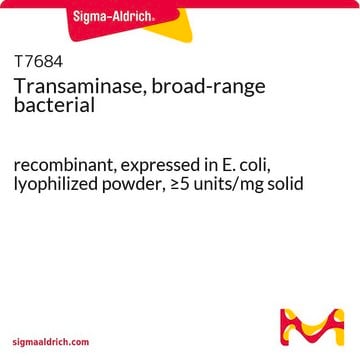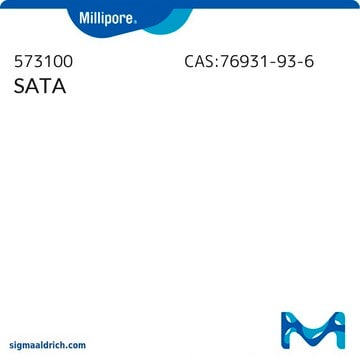Összes fotó(1)
Fontos dokumentumok
SAE0217
Enhanced Microbial Transglutaminase

Glycosylation tolerant, for site-specific antibody bioconjugation
Szinonimák:
Protein-Glutamine-γ-Glutamyltransferase, Protein-glutamine:amine γ-glutamyltransferase, eMTG
Bejelentkezésa Szervezeti és Szerződéses árazás megtekintéséhez
Összes fotó(1)
About This Item
UNSPSC kód:
12352204
Javasolt termékek
rekombináns
expressed in E. coli
Minőségi szint
specifikus aktivitás
≥30 units/mg protein
kiszállítva
dry ice
tárolási hőmérséklet
-10 to -25°C
Általános leírás
eMTG (Enhanced Microbial Transglutaminase) is an enzyme that catalyzes the formation of new isopeptide bonds between the primary amine of a drug linker and glutamine residues at position Q295 of IgG-type antibodies to produce site-specifically conjugated antibody-drug conjugates (ADCs).
Alkalmazás
Site-specific conjugation is increasingly used in drug research, development, and manufacturing to produce ADCs and bioconjugates with defined drug-to-antibody ratios (DAR) since the resulting homogeneity improves safety and efficacy. Transglutaminase (TG)-mediated bioconjugation is a promising means of conjugating drug linkers specifically to the Q295 position of antibodies. However, its use traditionally requires antibody or glycan engineering since the adjacent glycosylation at N297 interferes with the TG reaction. If you are interested in trying eMTG to make therapeutic ADCs but do not currently have the conjugation setup/expertise, please consider ADC Express™ Service for pre-clinical lead candidate selection.
Tulajdonságok és előnyök
• Increased efficiency - with one-step bioconjugation for ADCs
• Glycosylation-tolerant - no need to remove glycosylation allowing for a preserved glycan on the antibody conjugate product
• Built for purpose - eMTG has been designed for producing ADCs and bioconjugates
• For higher-grade quality suitable for cGMP manufacturing of ADCs, please reach out using this form https://www.sigmaaldrich.com/US/en/services/contract-manufacturing/adc-bioconjugation/adc-bioconjugation-request-information with eMTG selected.
• Glycosylation-tolerant - no need to remove glycosylation allowing for a preserved glycan on the antibody conjugate product
• Built for purpose - eMTG has been designed for producing ADCs and bioconjugates
• For higher-grade quality suitable for cGMP manufacturing of ADCs, please reach out using this form https://www.sigmaaldrich.com/US/en/services/contract-manufacturing/adc-bioconjugation/adc-bioconjugation-request-information with eMTG selected.
Egység definíció
One unit will catalyze the formation of 1.0 micromole of hydroxamate per minute from N Z GLN-GLY and hydroxylamine at pH 6.0 at 37°C.
Figyelmeztetés
Danger
Figyelmeztető mondatok
Óvintézkedésre vonatkozó mondatok
Veszélyességi osztályok
Resp. Sens. 1
Tárolási osztály kódja
11 - Combustible Solids
WGK
WGK 1
Analitikai tanúsítványok (COA)
Analitikai tanúsítványok (COA) keresése a termék sarzs-/tételszámának megadásával. A sarzs- és tételszámok a termék címkéjén találhatók, a „Lot” vagy „Batch” szavak után.
Már rendelkezik ezzel a termékkel?
Az Ön által nemrégiben megvásárolt termékekre vonatkozó dokumentumokat a Dokumentumtárban találja.
Stephan Dickgiesser et al.
Bioconjugate chemistry, 31(4), 1070-1076 (2020-03-07)
Site-specific bioconjugation technologies are frequently employed to generate homogeneous antibody-drug conjugates (ADCs) and are generally considered superior to stochastic approaches like lysine coupling. However, most of the technologies developed so far require undesired manipulation of the antibody sequence or its
Stephan Dickgiesser et al.
Methods in molecular biology (Clifton, N.J.), 2012, 135-149 (2019-06-05)
Antibody-drug conjugates (ADCs) are a relatively young class of cancer therapeutics that combine the superior selectivity of monoclonal antibodies (mAbs) with the high potency of cytotoxic agents. In the first generation of ADCs, the toxic payload is attached to the
Tudóscsoportunk valamennyi kutatási területen rendelkezik tapasztalattal, beleértve az élettudományt, az anyagtudományt, a kémiai szintézist, a kromatográfiát, az analitikát és még sok más területet.
Lépjen kapcsolatba a szaktanácsadással









